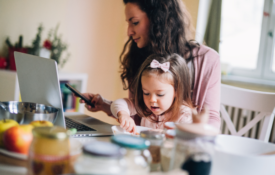-
What Studies Reveal About Social Distancing And Remote Working During Coronavirus
COVID-19 struck fast and hard when the whole world was unprepared for it. From social distancing, working from home (WFH) and panic buying, life took a sudden turn for the worse. As the new normal takes a foothold, mental health has become a bigger national concern as more Americans are forced to remain isolated away from loved ones and support systems. New studies are popping up to show the benefits and concerns of social distancing and remote working. These studies run the gamut from fears and vulnerabilities to a rise in virtual meetings that might be the future of work. ...
-

For Work-Family Balance, Give Policy a Personal Touch
Informal social support is essential for helping employees maintain work-family balance without facing professional consequences.
-

New Research in Psychological Science
A sample of research on mate preferences across countries, preference biases in candidate selection, cue visibility and task switching, and persuasion by nonhuman artificial agents.
-
How To Manage Your Career Through The Coronavirus Crisis: 6 Ways To Thrive When Nothing Is Certain
With the crisis caused by the coronavirus and COVID-19, the world feels upside down, and nothing is certain. Your work has probably tilted as well. Millions of people have been furloughed, taken wage cuts or are working in completely unexpected circumstances. At a minimum, you are likely working from home and figuring out how to make the best of videoconferencing and collaboration at a distance. So how can you manage your career through such trying times? ... First, stay positive and future focused. We all want to work with people who are optimistic and energetic—and this is especially true during tough times like these.
-
On Coronavirus Lockdown? Look for Meaning, Not Happiness
The coronavirus pandemic has not just threatened the physical health of millions but also wreaked havoc on the emotional and mental well-being of people around the world. Feelings of anxiety, helplessness and grief are rising as people face an increasingly uncertain future — and nearly everyone has been touched by loss. A nationally representative poll conducted by the Kaiser Family Foundation finds that nearly half of all Americans — 45 percent — feel that the coronavirus has negatively affected their mental health. Which raises a question: Is there anything people can do to cope with the emotional fallout of this confusing and challenging time? ...
-

APS Backgrounder Series: Psychological Science and COVID-19: Working Remotely
Expert commentary from Tammy Allen, who specializes in work-family issues, career development, and occupational health. [April 13, 2020]

